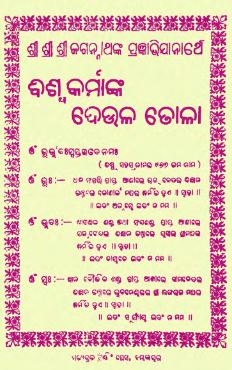Published in 1982, Sadasib Maharana’s Biswakarmanka Deula Tola stands out as a notable contribution to Odia literature, particularly in the realm of essay writing. Through this book, Maharana intertwines spirituality, cultural reflections, and profound observations, offering readers an enriching journey into the essence of Odia heritage and philosophy.
Biswakarmanka Deula Tola which can be translated as “The Abode of the Divine Artisan,” serves as a metaphorical title representing the holistic nature of creation and the divine craftsmanship visible in everyday life. Maharana’s essays delve into various aspects of life, art, and spirituality, drawing upon rich Odia traditions. The book is structured in a way that balances both personal anecdotes and broader philosophical musings, making it relatable for the average reader while also inviting contemplation on deeper existential themes.
At the core of Maharana’s writing is a deep spirituality that reflects his understanding of the interconnectedness of all beings and the divine. He utilizes metaphors of craftsmanship and artistry to describe the creator’s role in the universe. By likening the life experiences of individuals to the intricate details of a sculpture or a piece of art, Maharana encourages readers to perceive their existence as a manifestation of divine artistry. This perspective promotes a sense of gratitude and reverence towards life and its myriad forms.
The author also emphasizes the importance of introspection and self-discovery, urging readers to explore their inner landscapes. His essays resonate with teachings from various spiritual traditions, reminding us of the importance of humility, love, and compassion. He delves into how spirituality can be woven into the fabric of daily life, asserting that each moment holds the potential for divine connection.
Maharana’s work is rich in cultural references, celebrating the unique tapestry of Odia society. He explores various traditions, festivals, and practices that characterise the Odia way of life, painting a vivid picture of the socio-cultural milieu of his time. His keen observations about the customs and beliefs of the Odia people foster a deeper appreciation for their cultural heritage. Through his essays, one can feel the pulse of the land, igniting a sense of pride and belonging among Odia readers.
His narrative style is marked by eloquence and clarity, inviting readers to engage with both the content and the emotional resonance of the themes discussed. Maharana’s ability to weave personal stories with broader societal observations stands testament to his prowess as a writer and thinker.
Biswakarmanka Deula Tola by Sadasib Maharana is more than just an anthology of essays; it is a profound exploration of spirituality and culture woven into the rich fabric of Odia identity. Its publication in 1982 heralded a significant moment in Odia literature, inspiring generations to reflect on their lives through the lens of compassion, artistry, and divine connection. Maharana’s work continues to resonate, inviting readers to embrace the complexity and beauty of life, ultimately guiding them towards spiritual awakening and cultural appreciation. Through this book, Maharana not only captures the essence of human experience but also fosters a deeper understanding of the divine creation we find ourselves a part of.
Books Info
| Books name | Biswakarmanka Deula Tola/ବିଶ୍ବକର୍ମାଙ୍କ ଦେଉଳ ତୋଳା |
| Editor | Sadasib Maharana |
| No Of pages | 99 |
| Publisher | Smt. Praphulla Kumari Maharana |
| Publication | 1982 |
| Printed At | NA |
| Distributor | NA |

